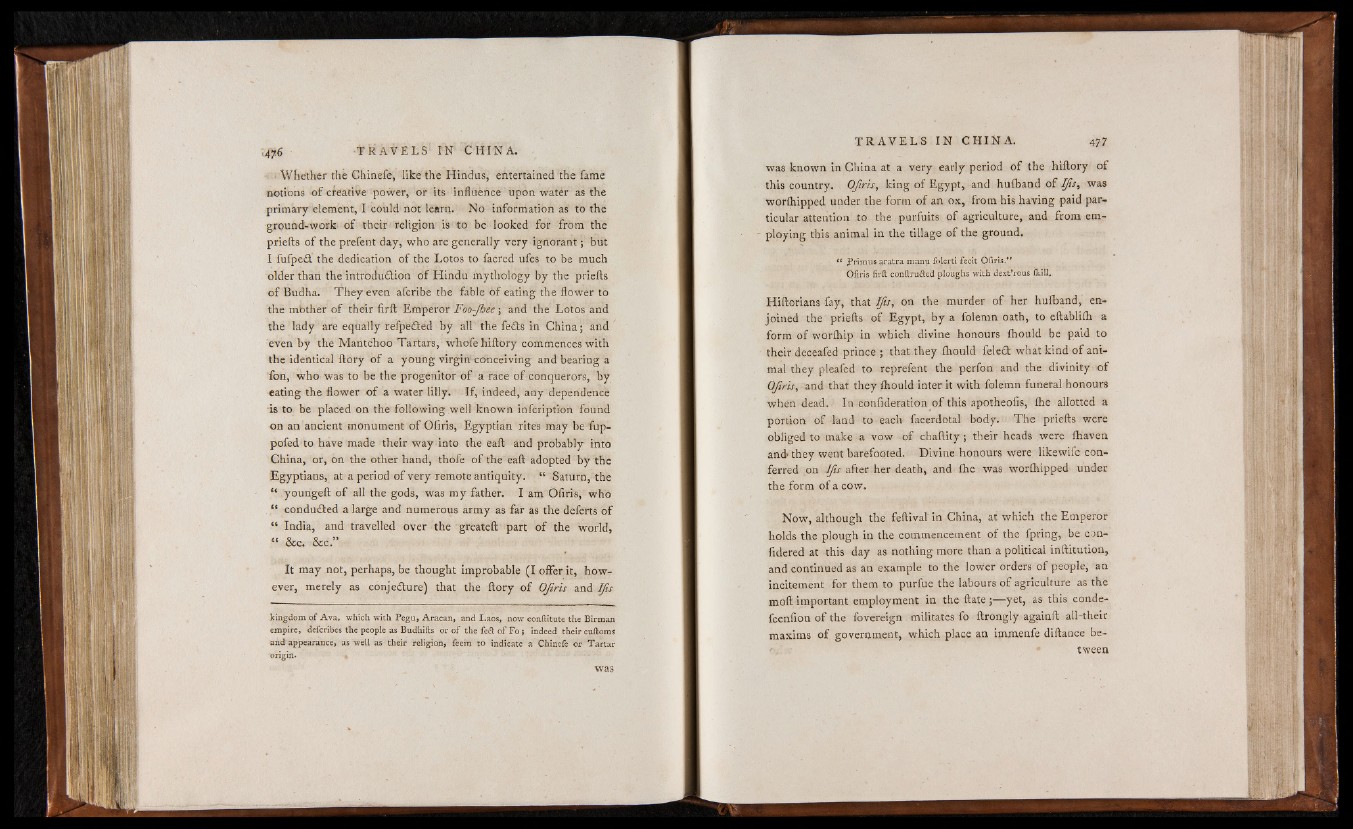
, v T I
i l l
Whether the Ghinefe, like the Hindus, entertained the fame
notions o f creative power, or its influènce upon watér as the
primary element, I could not leàrn. No information as to the
ground-work- o f their religion is to be looked for from the
priefts o f the prefent day, who ate generally very ignorant ; blit
I fufped. the dedication of the Lotos to facred ufes to be much
older than the introdudion o f Hindu mythology by the priefts
o f Budha. T h e y even afcribe the fable o f eating the flower to
thé mbther o f their firft Emperor Foo-J!:ee ; and the Lotos and
the lady are equally refpeded by all' the feds in China; and
even by the Mantchoo Tartars, whofehiftory commences with
the identical ftory o f a young virgin1 conceiving and bearing a
fon, who was to be the progenitor o f a race o f conquerors, by
eating the flower o f a water lilly. If, indeed, any dependence
is to be placed on the following well known infcription found
on an ancient monument o f Ofiris, Egyptian rites may be fup-
pofed to have made their way into the eaft and probably into
China, or, on the other hand, thofe o f the eaft adopted by the
Egyptians, at a period o f very remote antiquity. “ Saturn, the
“ youngeft o f all the gods, was my father. I am Ofiris, who
“ conduded a large and numerous army as far as the deferts o f
“ India, and travelled over the greateft part o f the world,
“ & c , & c .”
It may not, perhaps, be thought improbable (I offer it, however,
merely as conjedure) that the ftory o f Ofiris and Ifis
kingdom of Ava, which with Pegu, Aracan, and Laos, now conilitute the Birman
empire, defcribes the people as Budhifts or o f the fed o f F o ; indeed their cuftoms
and appearance, as well as their religion, feem to indicate a Chinefe or Tartar
origin*
was
mm
was known in China at a very early period o f the hiftory o f
this country. Ofiris, king of Egypt, - and hufband o f Ifis, was
worihipped under the form o f an ox, from his having paid particular
attention to the purfuits o f agriculture, and from employing
this animal in the tillage o f the ground.
“ Primus aratra manu folerti fecit Ofiris/'
Ofiris firft conftru&ed ploughs with dext'rous ikill.
Hiftorians fay, that Ifis, on the murder o f her hulband, enjoined
the priefts o f Egypt, by a folemn oath, to eftablifh a
form o f worihip in which divine honours ihould be paid to
their deceafed prince ; that they ihould felect what kind o f animal
they pleafed to reprefent the perfon and the divinity o f
Ofiris, and that they ihould inter it with folemn funeral honours
when dead. In confideration o f this apotheofis, ihe allotted a
portion o f land to each facerdotal body. The priefts were
obliged to make a vow of chaftity; their heads were ihaven
and» they went barefooted. Divine honours were likewife conferred
on Ifts after her death, and Ihe was worihipped under
the form o f a cow.
Now, although the feftival' in China, at which the Emperor
holds the plough in the commencement o f the fpring, be con-
fidered at this day as nothing more than a political inftitution,
and continued as an example to the lower orders o f people, an
incitement for them to purfue the labours o f agriculture as the
moft important employment in the- ftate;— yet, as this conde-
fcenfion o f the fovereign militates fo ftrongly againft all-their
maxims o f government, which place an immenfe diftance between